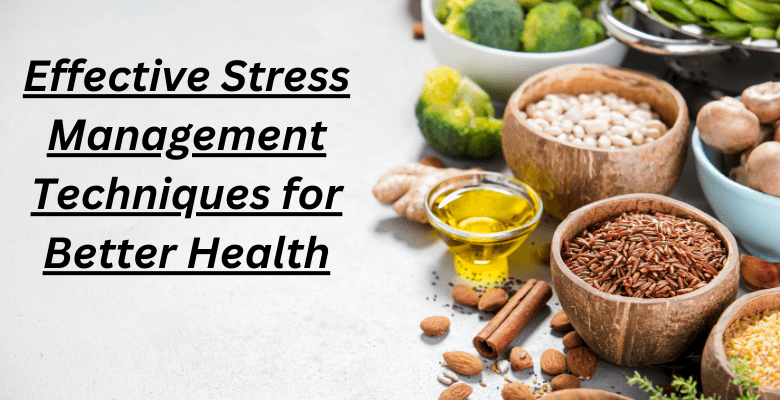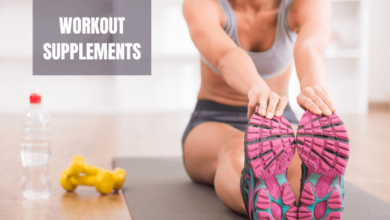Effective Stress Management Techniques for Better Health

Stress is a characteristic reaction of the body to testing circumstances. It is a normal part of life, and a small amount of stress can help you stay motivated and focused. However, excessive stress can be detrimental to your health, causing physical and mental issues such as high blood pressure, heart disease, anxiety, and depression. In this manner, it is fundamental to actually oversee pressure. In this article, we will discuss the best stress management techniques that can help you maintain good health and well-being.
Understanding Stress
Stress is a response to a challenging or threatening situation that requires your body to produce adrenaline and cortisol hormones. The physical and mental changes that occur during this response are called the “fight or flight” response. The response is designed to help you cope with the situation, but if it continues for a prolonged period, it can cause physical and emotional problems.
Symptoms of Stress
Symptoms of stress can vary from person to person, but they generally include:
- Anxiety
- Depression
- Fatigue
- Headaches
- Digestive issues
- Insomnia
- Irritability
- Muscle tension
- Rapid heartbeat
- Shortness of breath
- Sweating
- Difficulty concentrating
Causes of Stress
There are several things that might cause stress, including:
- Work-related stress
- Financial problems
- Relationship issues
- Health problems
- Traumatic events
- Major life changes
- Environmental factors
Effects of Chronic Stress on Health
Constant pressure can have a negative impact on your physical and mental health. It can cause:
- High blood pressure
- Heart disease
- Stroke
- Diabetes
- Depression
- Anxiety
- Obesity
- Digestive issues
- Sleep disorders
Effective Stress Management Techniques
- Deep Breathing: Deep breathing is a relaxation technique that can help you reduce stress and anxiety. It includes taking sluggish, full breaths through your nose and breathing out leisurely through your mouth.
- Meditation: Meditation is a mindfulness technique that can help you focus on the present moment and reduce stress. It involves sitting quietly and focusing on your breathing or a specific word or phrase.
- Exercise: Exercise is an effective stress reliever. It releases endorphins, which are natural mood boosters, and it can also help reduce stress hormones.
- Journaling: Journaling is an excellent way to reduce stress and anxiety. It allows you to express your thoughts and feelings on paper, helping you gain clarity and perspective.
- Time Management: Poor time management can cause stress. To manage your time better, create a to-do list, prioritize your tasks, and avoid multitasking.
- Positive Self-Talk: Positive self-talk can help you manage stress by changing your perception of stressful situations. Instead of thinking negatively, try to focus on positive thoughts and outcomes.
- Social Support: Social Help: Having an emotionally supportive network can assist you with overseeing pressure. Talk to friends or family members about your stressors, or consider joining a support group. Surrounding yourself with positive and supportive people can make a significant difference in managing stress.
- Getting Enough Sleep: Lack of sleep can increase stress levels and make it difficult to manage stress. Make sure to get enough sleep every night by creating a relaxing bedtime routine and avoiding electronics before bed.
- Mindfulness: Care: Care is a training that includes being available and completely participating in the occasion. By zeroing in on the current second, you can diminish pressure and nervousness.
- Relaxation Techniques: Relaxation techniques such as progressive muscle relaxation, visualization, and autogenic relaxation can help reduce stress by promoting relaxation and calmness.
- Music Therapy: Music therapy is a powerful stress-relieving tool. Listening to calming music can reduce stress and anxiety by slowing down the heart rate and lowering blood pressure.
- Fragrant healing: Fragrant healing includes utilizing medicinal balms to advance unwinding and decrease pressure. Medicinal oils like lavender, chamomile, and peppermint have been displayed to have quieting impacts.
- Laughter Therapy: Laughter is an effective stress reliever. It can reduce stress hormones and release endorphins, promoting relaxation and happiness.
- Massage Therapy: Massage therapy can help reduce stress by promoting relaxation and reducing muscle tension. It can also increase the production of endorphins, which can improve mood and reduce stress hormones.
- Needle therapy: Needle therapy is a conventional Chinese medication practice that includes embedding needles into explicit places in the body. It has been shown to be an effective stress reliever by reducing tension and promoting relaxation.
Conclusion
Stress is a natural part of life, but it is important to manage it effectively to prevent physical and mental health problems. By incorporating the above stress management techniques into your daily routine, you can reduce stress, improve your mood, and enhance your overall well-being.
FAQs
- What is the most ideal way to rapidly diminish pressure?
- Deep breathing and meditation can be effective ways to reduce stress quickly.
- What is the most effective way to manage chronic stress?
- Exercise, social support, and relaxation techniques such as meditation and massage therapy can be effective ways to manage chronic stress.
- Is it possible to eliminate stress completely?
- No, stress is a natural part of life, but it is possible to manage it effectively.
- Can stress cause physical health problems?
- Yes, chronic stress can lead to physical health problems such as high blood pressure, heart disease, and diabetes.
- What is the most important stress management technique?
- There is no single most important stress management technique. It is important to find what works best for you and incorporate it into your daily routine.




